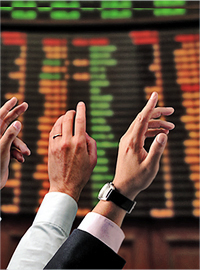| Blaming “Oil Speculators” Is Like Scapegoating Gamblers for the Super Bowl Result |
 |
|
By Timothy H. Lee
Thursday, April 26 2012 |
Gasoline cost $1.84 per gallon in January 2009 when Barack Obama entered the White House. Today, that cost has more than doubled to almost $4.00 per gallon. In fact, U.S. News observed this month that gas prices have increased even more under Obama than under Jimmy Carter, he of late-‘70s gas line infamy: “Obama has seen an even higher gas price increase than Carter dealt with under his administration. Under the Carter administration, gas prices increased by 103.77 percent. Gas prices since Obama took office have risen by 103.79 percent. No other presidents in recent years have struggled as much with soaring oil prices. Under the Reagan administration, gas prices actually dropped 66 percent. When Bill Clinton was president, gas prices grew by roughly 30 percent, and under both Bush presidencies, gas prices rose by 20 percent.” Conspiracy theorists were apoplectic during both Bush administrations – “No blood for oil!” – but they’ve conspicuously changed their tune despite even steeper price increases under Obama. When prices reached $3.07 in May 2007, Nancy Pelosi shamelessly blamed Bush. “Years of Bush administration policies that have favored Big Oil over the consumers,” then-Speaker Pelosi alleged, “have resulted in record dependence on foreign oil, leaving American families and businesses to pay even higher prices.” With prices significantly higher today than they were then, does Pelosi hold Obama similarly accountable? Naturally not. Today, “oil speculators” have become the convenient culprits. “Supply is up, demand is down,” she said just last month. “You would think the price would come down, but enter the speculators,” she charged. Obama, who has elevated blamestorming to art form throughout his three years, shamelessly peddled the same illogic. “We can’t afford a situation,” he decreed last week, “where speculators artificially manipulate markets by buying up oil, creating the perception of shortage, and driving prices higher, only to flip the oil for a quick profit.” For good measure, Obama attempted demonization-by-association by adding, “And for anyone who thinks this cannot happen, just think back to how Enron traders manipulated the price of electricity.” To have an American president descend into such economic illiteracy to escape blame is a shameful state of affairs. Especially when that president has arbitrarily blocked the Keystone XL oil pipeline, unjustifiably halted offshore production and appointed an army of extremist government administrators who explicitly prefer European-level gas prices. But what exactly are “speculators,” anyway? They’re simply market investors who purchase a commodity, such as oil, on the belief that future prices for that commodity will rise. That belief might be based on information, experience or mere hunch. In any case, speculation is an important tool for industries such as airlines to ensure future availability of that commodity against shortages or price increases while they possess the current ability to buy. By doing so, such industries can level fluctuations in market supply over a particular period. But here’s the key detail, which people like Obama and Pelosi somehow fail to fathom. For every speculator willing to buy a commodity on the belief that prices will later rise, there is a counterparty willing to sell on the belief that prices will later decline. One of them is going to be right, and one is going to be wrong. If the purchasing party is correct, then it has successfully secured a commodity that subsequently becomes more scarce and expensive for whatever reason. If unsuccessful, however, the purchasing party has a commodity on its hands that subsequently becomes cheaper and more available. Thus, speculation is a bet, one with no guarantee for either party of future success. In that sense, a speculator is no different than a gambler in Las Vegas placing a wager on a sporting event. In last season’s Super Bowl, for instance, the New England Patriots opened up as three-point favorites over the New York Giants. People who speculated that the Giants would either win the game or lose by fewer than three points enjoyed the subsequent payoff. Obviously, however, wagers on the Giants didn’t determine the ultimate score any more than the casinos who installed the Patriots as the favorite ensured a New England victory. Similarly, speculators are effectively no different than stock market participants. For every buyer who believes a particular stock will rise in value, there’s obviously a counterparty seller who believes that the stock will decline. Moreover, multiple official investigations have failed to justify claims that market speculation is to blame for oil prices. That never seems to stop politicians like Obama from scapegoating out of self-interest, but it’s ultimately no more intelligent than blaming gamblers for the Super Bowl score. |
Related Articles : |
























